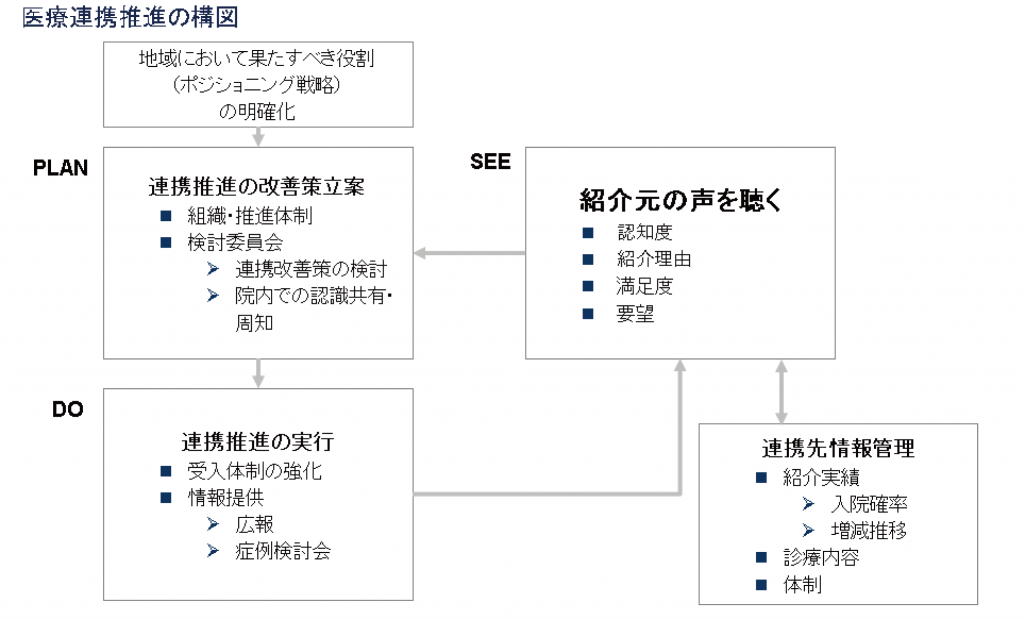医療連携推進は依然として最重要課題の一つ
コロナ禍の中、外来患者が減少し、病床稼働が落ちている病院も多いと聞きますが、医療連携の推進は、病院経営において、収益を安定させるために最重要課題の一つであり続けていると思います。
厳しい経営環境の中でも、紹介元クリニックと強い信頼関係を構築している病院の経営は安定しているようです。そして、医療連携推進のために、先ずは「連携先の意見を真摯に聴く」姿勢が基本だと改めて思います。
アンケートから再始動した事例
連携推進に向けて、地方の400床規模の病院が一丸となってアンケート調査を実施したことがありました。院長先生が「地域のクリニックの先生方は、どのような要望を当院に対して持っているのか、是非とも知りたい」と強い指示を出して実現したものです。医療連携室だけでなく、事務方、コメディカルに看護師も加わって、郵送だけでなく、訪問配布も行った結果、かなりの回答を得ることができました。
すると、アンケート実施後すぐに、紹介件数が増加するという効果がでました。「私どもの対応に問題はないでしょうか。ご要望があれば是非お聞かせください」という、連携推進に対するこの病院の本気度が伝わったためと思われます。
さらに、アンケート実施を評価されたという一時的な効果だけで終わらせることなく、継続的な信頼関係を構築すべく、委員会が設けられ、寄せられた改善要望への対応が院内で検討されました。すぐに対応できないものも多くありましたが、要望はしっかりと承り、改善に向けて具体的に取り組んでいくことを、地域のクリニックに対して、アンケート結果の集計報告とともに伝えました。このようなやりとりが、クリニックに支持される病院づくりには不可欠だと思います。
回答者の中には「この用紙では書ききれない」と言って、別途、要望(不満)を数枚にわたって書いてくださった開業医の先生もありました。病院にとって耳の痛いご意見を書いてくださった先生には連携室から御礼を申し上げ、この後、その診療所は病院のロイヤルカスタマー(紹介元)となっています。
紹介元からの要望
このアンケートに寄せられた主な要望は次のようなものでした
① 紹介して大丈夫なのかよくわからない(診療実績がわからず、担当医師の顔がみえない)
② 紹介した患者をきちんと受け入れてほしい(予約が取りにくい、予約したのに待たされた)
③ 診療の状況をきめ細かく知らせてほしい(返書や報告をもらう前に患者から先に知らされた)
④ 紹介した患者は囲い込まず返してほしい
⑤ 患者の紹介ばかり求めず、そちらからも紹介してほしい
⑥ 時間外や緊急の患者受入にもっと対応してほしい
他の病院でアンケートやヒアリングを実施した際にも、同じような要望が寄せられます。
自院の強みがきちんと伝わっているか
自院の強みだと自負していることが、クリニックから評価されていないことや、誤って伝わっていることもよくあります。この認識のギャップを定期的に把握することはその後の対策立案にむけて非常に有益です。
自分たちの得意とする領域の紹介患者が少ないと不満をもらす病院ほど、その強みをしっかりと地域の紹介元に伝えきれていないケースが多くみられます。そして、そのことを把握できていません。
地域のクリニックにヒアリングしてみると、「ホームページに記載されている診療科の実績が最新データに更新されていない」など、よく言われます。
独りよがりにならずに相手の声を聴く
私たちは外部の第三者として、クライアント病院に代わって、地域の病院、診療所、救急隊を訪問してお話しを聴く機会がよくありますが、直接には言いづらい忌憚のないご意見を伺い、クライアント病院の独りよがりの認識が明らかになることもしばしばです。
一般企業の経営においても、メインの商品・サービスを「どうしても欲しい」と言ってくれる重要顧客は誰なのか、そして、なぜ、その顧客は、他の商品・サービスがある中で、その企業の商品・サービスを選んでくれるのか、を追究することが重要となります。
医療連携においても、自院の地域における果たすべき役割(ポジショニング戦略)を明確にしたうえで、なぜ、連携先(紹介元)は、他にも病院がある中で、当院に紹介してくれているのか、問い続け確認することが重要です。
・ 当院の診療科の治療実績が評価されているから
・ 当院の対応を評価してくれているから
・ 医師同士がよく知っているから
・ 他の医師の推薦があったから
・ 患者が希望したから
・ いつも紹介している病院が立て込んでいて紹介を受けてくれなかったから
・ ただ近いから
本当の理由を聞き出すためには、ある程度関係を構築したうえで、質問のタイミングややり方を考える必要があるかもしれません。できるかぎり具体的に紹介決定要因を確認し、それが病院の強みによるものとなるよう取り組んでいく必要があります。
円滑な双方向コミュニケーション実現に向けて
紹介元と紹介される病院とでは、認識にギャップがあることはよくありますが、その認識ギャップをうめる努力も常に実施していく必要があります。クリニックの置かれた状況、受入側の病院の人員体制などについて、定期的に直接面談・懇談の機会を設け、もっとお互いに相手の状況がわかれば、同じ医師、医療従事者同士で理解が進み、連携が進むこともよくある話です。
このように円滑な双方向コミュニケーションを進め、信頼関係を構築するためには、まずは、「相手の状況をよく聴き、理解する」ことが重要ではないでしょうか。
ひたすら病院の強みを説明し、紹介をお願いするだけでなく、紹介元の置かれた状況や要望をよく聴き、こちらの対応で改善できることはないか、支援できることはないのか、相手の欲しい情報は何なのか、よく考えて、図のようにPlan・Do・Seeサイクルをまわしながら連携推進活動を不断に強化していくことが、求められているのではないでしょうか。
文責:藤井 康弘

藤井 康弘(株式会社CDIメディカル シニアコンサルタント )
慶應義塾大学文学部(人間科学専攻)卒。
ライフタイムパートナーズ株式会社、EYアドバイザリー・アンド・コンサルティング株式会社、他を経て、現在に至る。
